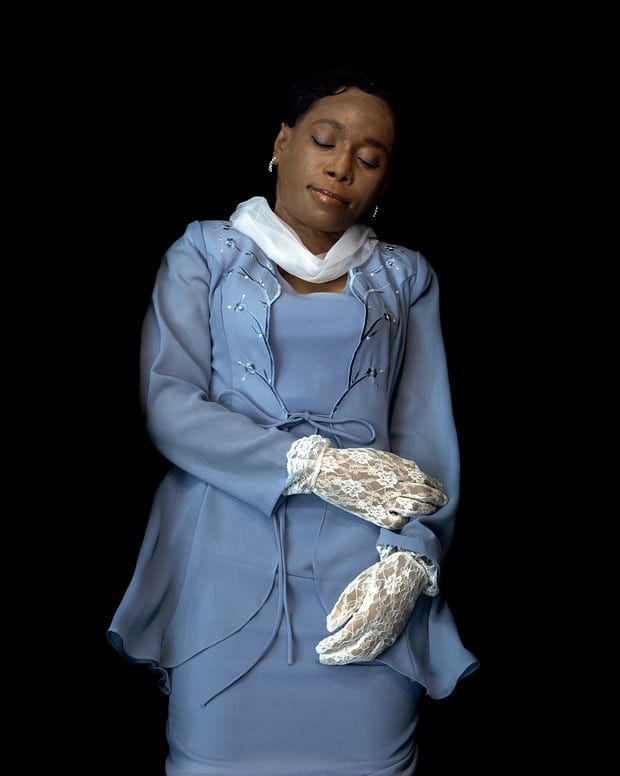Elizabeth Heyert's photo
Kathryn Day • 19 March 2018
Since I have been working as a celebrant, I have come to realise what a humbling experience it is to write and perform a funeral for someone you don’t know. The process of learning all about someone’s life and then to write and deliver their story for them is so special, the hardest part knowing that they will never know what was said about them. It’s a weird feeling getting to know someone so well but only after their death. Their story may have been extremely sad and although the photographer in the article below was able to ‘cover this up’ it leaves us with an immense sadness.
https://www.theguardian.com/…/elizabeth-heyert-best-

I have always advocated against the idea that one size fits all when planning a funer al. We are all different , and so our final celebration on earth should reflect that. However, in recent years, direct cremation has quietly slipped into the mainstream, marketed as the fuss-free option with no service, no gathering, no ceremony... just a straightforward, simple process at a lower cost. On the surface, for anyone considering their own funeral and concerned about the fuss they leave for their family it can seem like a practical choice. Life is busy, money is tight, and many families feel overwhelmed at the thought of organising a funeral. Direct cremations can be a worthwhile choice for many, especially if organised through your local Funeral Director with a celebration of life ceremony shortly afterwards. However, the use of direct cremation isn’t widely advertised locally by a high street firm. Instead, it is heavily promoted by large corporations. These aren’t funeral directors with premises who know the families, understand the area, or have a relationship with the community. They are multinational companies with large advertising budgets and shareholders to satisfy. Their adverts are enticing, the price is affordable, and the message focuses on convenience. But what they don’t mention is the long-term emotional cost—the inability to visit loved ones in a chapel of rest to say goodbye, or even to be familiar with the crematorium they are taken to (anywhere in the UK). Funerals or a celebration of life event bring people together. Something happens when people gather with a shared purpose. I’ve witnessed families who have their fair share of tension find themselves reunited by grief, and the funeral may be the first time they speak for years. The person who has died leaves memories that run through every relationship in the room, and for a short time, those threads draw people closer rather than pushing them apart. There’s a power in shared memories. When people gather, they bring with them their collections of stories. You suddenly learn things you never knew, adding layers to your understanding of who your person really was. Without a gathering of remembrance, those opportunities fade away. There’s also the grieving process itself. Grief needs form; it needs a moment to settle. A ceremony, no matter how simple, offers us a framework for that. Being with others, reconnecting with familiar faces, listening to stories, feeling the warmth of shared loss, helps people transition from shock to mourning, and then to remembrance. When that is taken away, the grieving process can seem stalled; there is nowhere for us to process our sadness. No space to offer gentle closure. Direct cremation absolutely has its place; for some, it’s the right choice due to personal, financial, or practical reasons. However, as it becomes more widespread, we should consider what we might be giving up along the way. Goodbyes are important. They help us find closure, bring families and communities together, and the memories of that day stay with us long after the event itself.

How does grief affect us? Grief does not discriminate. Whoever we are, we all experience the loss of a loved one at some point in our lives, regardless of our age, our religious belief, our culture, grief is universal. No one ever moves on from the loss of a loved one, but they learn to move forward in life . We dont forget our loved ones but the sadness eventually becomes mixed with appreciation of having had them in their lives. We are all different in the way we grieve, there isn’t a right or wrong way . Some people put on a brave face, go back to work as soon as they can, return to what they consider their normal lives. Others can fall to pieces, and never get to grips with their loss, sometimes taking years before they feel able to cope again. I also know from personal experience that grief can creep up on you in the strangest of places, you can nip out to the supermarket, pick up a tin of beans and your world suddenly falls apart. Grief doesn’t just leave people with a feeling of loss, it can also involve quite extreme emotions, such as guilt and anger. There may be unfinished conversations with loved ones or feelings or thoughts of what should or shouldn’t have been said or done. There isn’t a set time for recovery, for many it can take up to two years but then others may grieve for much shorter or longer periods. Putting pressure on your loved one to move on in life can actually slow down the healing process. What should I say? So many of us worry about what can we say to someone who is grieving, even to the point that we avoid discussing the death of their loved one or in some cases actually avoid seeing or talking the person who is grieving. What is actually needed is not for you to say something profound that can wipe away their sadness in a sentence but for you to just sit and listen . Having our sadness acknowledged by others is so important. Please don’t avoid the subject, we need to remember and reflect on the lives of those we have loved and lost to keep them alive in our minds. Don’t try to force anyone to open up on how they feel about their grief, as we have said we are all different and have different feelings at different times. Just let them know you are there for them to cry on, talk to or just sit in silence with . Often, comfort can be found by just being with someone who cares, if you can’t think of something to say, a smile, squeeze of the hand, or a reassuring hug can be so helpful. Often when we are grieving we think others may feel uncomfortable talking about their grief. Put them at their ease, try not to use words that avoid the word 'death', such as passed away, instead actually stating the words death or died whilst expressing your sadness shows the grieving person that you are happy to talk and don't feel uncomfortable. How can I help? It can be hard to ask for help. Fear of being seen as an attention seeking, being a burden to others, or just not having the energy to ask for help can prevent someone who is grieving from asking for help. Be consistent, don’t offer lots of help for a week and then back away, let them know you are there for as long as they need you . So instead of saying 'let me know if you need anything', try saying, I’m off to the supermarket, what shall I get for you? There are so many ways in which you offer help, from supporting the planning of the funeral, helping with children, or doing a bit of cleaning or washing. Whatever you offer, it will be appreciated and help the person to focus on their own recovery. In some cultures, it is customary for family and friends to take meals round to the grieving family’s home, an excellent idea. It’s usually after the funeral and when the deluge of cards and flowers have stopped arriving that a grieving person needs the most support. It is at this time when there are high expectations of returning to normal. The grieving process can last a long time it doesn’t just stop when the funeral finishes . Your support can be most valuable at this time, keep in touch by dropping in, posting a letter or card, or regularly sending a text message. Don’t make assumptions on outward appearances . Whilst they may present as ‘I am coping’ on the outside, they may be struggling on the inside. Try not to make remarks that puts pressure on someone to keep up appearances such as “You are so strong” or “You look so well.” This can result in them hiding their real feelings. Remember the special days, birthdays, anniversaries, Christmas, these all have the power to reignite grief. Acknowledgement that these occasions can evoke sad feelings can be helpful. Last but not least, look out for signs of depression, if the grief doesn’t seem to be subsiding at all or is in fact getting worse then it may be necessary to encourage a visit to the GP. Above all, remember no two people grieve the same and sadly we aren't able to wave a magic wand, but we can be there to support and ease the grieving process. Sources of Support Help can be accessed by the following organisations. Many more can be found on google. Cruse 0808 808 1677 Survivors of Bereavement by Suicide 0300 111 5065 Childhood Bereavement Network 020 7843 6309

We are living within an unprecedented situation, a world behind the closed doors of self-isolation, a world of lockdown and potential sadness.
As a celebrant working in the funeral industry, it is becoming clearer that funerals will need to change, we need to be creative as we may find themselves in a situation where funerals for our loved ones are not able to be held.




